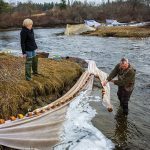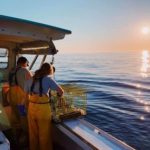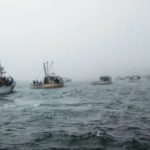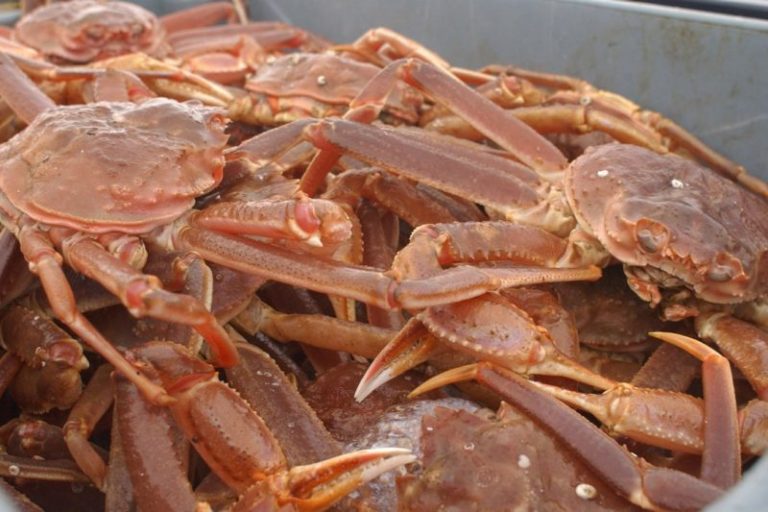Daily Archives: June 29, 2016
New Bedford to unveil Fishermen’s Tribute Monument at 6 p.m. June 30 in Tonneson Park
 New Bedford will celebrate the installation of the Fishermen’s Tribute Monument at 6 p.m. June 30 located in Tonneson Park on the New Bedford waterfront. The installation of the bronze statute will serve as a public tribute to the generations of commercial fishermen and their families. The Fishermen’s Tribute Fund Committee, lead by chairperson Deb Shrader, fundraised for more than 10 years to make the monument a reality. The Fishermen’s Tribute Monument is a bronze statue that depicts the scene of a fishing family; a mother stands near her fisherman husband, who is down on one knee, his daughter in his lap hugging him, his hand on the shoulder of his son who holds a crew cap. The sculpture is the work of New Bedford artist Erik Durant. The passing of the cap to the son signifies the continuation of the fishing tradition, while the clinging daughter expresses the regret of separation that her mother must hold in. The woman is located in the back of the scene, standing tall, representing the wives and mothers who stay behind to hold their families together while fishermen are at sea. Link 21:38
New Bedford will celebrate the installation of the Fishermen’s Tribute Monument at 6 p.m. June 30 located in Tonneson Park on the New Bedford waterfront. The installation of the bronze statute will serve as a public tribute to the generations of commercial fishermen and their families. The Fishermen’s Tribute Fund Committee, lead by chairperson Deb Shrader, fundraised for more than 10 years to make the monument a reality. The Fishermen’s Tribute Monument is a bronze statue that depicts the scene of a fishing family; a mother stands near her fisherman husband, who is down on one knee, his daughter in his lap hugging him, his hand on the shoulder of his son who holds a crew cap. The sculpture is the work of New Bedford artist Erik Durant. The passing of the cap to the son signifies the continuation of the fishing tradition, while the clinging daughter expresses the regret of separation that her mother must hold in. The woman is located in the back of the scene, standing tall, representing the wives and mothers who stay behind to hold their families together while fishermen are at sea. Link 21:38
Vessel rescues 19 fishermen from burning boat off Bermuda
 A plume of black smoke alerted the crew of a cargo vessel to possible distress. As they pulled closer in the Atlantic Ocean, they found a fishing boat engulfed in flames and the sailors in the water. The ship, K. Coral, hoisted 17 fishermen aboard. Two others drifted away while clinging to a makeshift raft made from fishing buoys. Lookouts searched for several hours, through nightfall and heavy wind and rain, before the crew pulled them both to safety as well. The ship arrived this week to unload steel in New Haven, Connecticut, where a delegation from the U.S. Coast Guard on Monday honored the captain and crew for carrying out the rescue last week 900 miles southeast of Bermuda. Park Hyog Soo, the South Korean captain of the Panama-flagged K. Coral, said in Wednesday an email to The Associated Press that the entire effort felt like something out of a movie. “Until now I, and my crew, still can’t believe that we had rescued 19 people,” he said. Read the story here 21:12
A plume of black smoke alerted the crew of a cargo vessel to possible distress. As they pulled closer in the Atlantic Ocean, they found a fishing boat engulfed in flames and the sailors in the water. The ship, K. Coral, hoisted 17 fishermen aboard. Two others drifted away while clinging to a makeshift raft made from fishing buoys. Lookouts searched for several hours, through nightfall and heavy wind and rain, before the crew pulled them both to safety as well. The ship arrived this week to unload steel in New Haven, Connecticut, where a delegation from the U.S. Coast Guard on Monday honored the captain and crew for carrying out the rescue last week 900 miles southeast of Bermuda. Park Hyog Soo, the South Korean captain of the Panama-flagged K. Coral, said in Wednesday an email to The Associated Press that the entire effort felt like something out of a movie. “Until now I, and my crew, still can’t believe that we had rescued 19 people,” he said. Read the story here 21:12
$10M spent by N.B. government to expunge crab fishermen’s loans
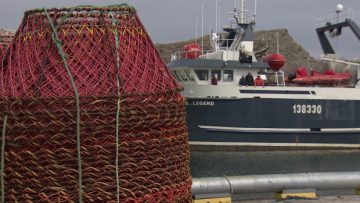 Documents obtained by Radio-Canada reveal that from 2000 to 2008, the New Brunswick government spent $10 million to erase the debts of 15 crab fishermen, amassed in the 1980s and 1990s as part of a lending program through the department of Agriculture, Aquaculture, and Fisheries. The total amount forgiven was $10,769,225. Seventeen crab fishermen received $15 million in public funds in the form of loans and loan guarantees for the construction of fishing boats. Fifteen weren’t able to repay their loans. Several fishermen sold their boats, and three boats were seized by the province. Only one fisherman was able to honour this loan guarantee, valued at $500,000. One of the 17 loans, granted in 1984, is still outstanding. The original amount loaned by the New Brunswick government was $687,323 and has since climbed to $880,569 with interest. Read the rest here 20:47
Documents obtained by Radio-Canada reveal that from 2000 to 2008, the New Brunswick government spent $10 million to erase the debts of 15 crab fishermen, amassed in the 1980s and 1990s as part of a lending program through the department of Agriculture, Aquaculture, and Fisheries. The total amount forgiven was $10,769,225. Seventeen crab fishermen received $15 million in public funds in the form of loans and loan guarantees for the construction of fishing boats. Fifteen weren’t able to repay their loans. Several fishermen sold their boats, and three boats were seized by the province. Only one fisherman was able to honour this loan guarantee, valued at $500,000. One of the 17 loans, granted in 1984, is still outstanding. The original amount loaned by the New Brunswick government was $687,323 and has since climbed to $880,569 with interest. Read the rest here 20:47
Fishery closures suggested to save West Coast killer whales
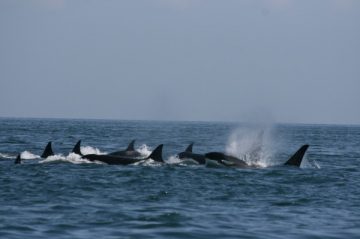 Strategic fishery closures and marine habitat protection are part of a proposed plan by the federal government to protect the threatened killer whales off Canada’s West Coast. The recovery plan for the Northern and Southern Resident Killer Whale population has been set out online by the Department of Fisheries and Oceans with a 60-day public comment period. The document makes 94 recommendations to help the two distinct whale populations that eat only fish. The Northern Residents are listed as threatened in Canada, while the United States has declared its Southern Resident population endangered. A team of experts from the federal Fisheries Department, Parks Canada, the Vancouver Aquarium and the National Oceanographic and Atmospheric Administration in the United States developed the plan between 2011 and 2014. Read the rest here 20:05
Strategic fishery closures and marine habitat protection are part of a proposed plan by the federal government to protect the threatened killer whales off Canada’s West Coast. The recovery plan for the Northern and Southern Resident Killer Whale population has been set out online by the Department of Fisheries and Oceans with a 60-day public comment period. The document makes 94 recommendations to help the two distinct whale populations that eat only fish. The Northern Residents are listed as threatened in Canada, while the United States has declared its Southern Resident population endangered. A team of experts from the federal Fisheries Department, Parks Canada, the Vancouver Aquarium and the National Oceanographic and Atmospheric Administration in the United States developed the plan between 2011 and 2014. Read the rest here 20:05
Misuse of the precautionary approach in fisheries management – A Conversation with Carl Walters
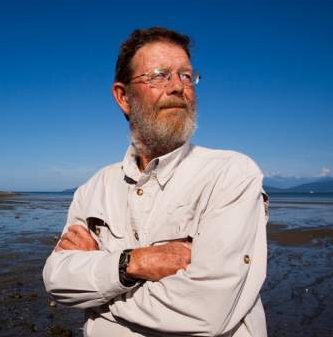 We spoke with Carl Walters of the University of British Columbia about the misuse of the precautionary approach by risk-averse scientists and conservation advocates. His concern arises from the application of the precautionary approach to Western Canadian salmon fisheries, which he believes has negatively impacted Canadian salmon fishermen and resulted in “virtually, an economic collapse.” He began by first differentiating between the precautionary principle and the precautionary approach, the former he claimed to be “a perfectly sensible statement that I think almost everyone would subscribe to about the need to avoid irreversible harm when possible…in the management of any system. There’s a different creature that has arisen in fisheries policy…called the precautionary approach to management” – this is the one that upsets him (00:35). Read the rest here Click here to listen 16:18
We spoke with Carl Walters of the University of British Columbia about the misuse of the precautionary approach by risk-averse scientists and conservation advocates. His concern arises from the application of the precautionary approach to Western Canadian salmon fisheries, which he believes has negatively impacted Canadian salmon fishermen and resulted in “virtually, an economic collapse.” He began by first differentiating between the precautionary principle and the precautionary approach, the former he claimed to be “a perfectly sensible statement that I think almost everyone would subscribe to about the need to avoid irreversible harm when possible…in the management of any system. There’s a different creature that has arisen in fisheries policy…called the precautionary approach to management” – this is the one that upsets him (00:35). Read the rest here Click here to listen 16:18
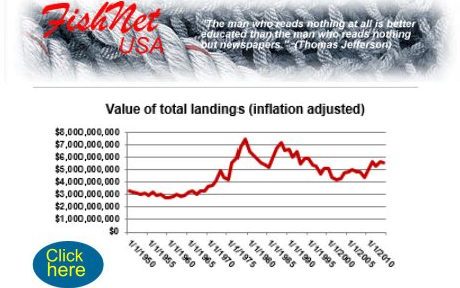
Magnuson management – how well is it working?
“Through investment and sacrifice on the part of our commercial and recreational fishermen, today, landings by U.S. commercial fishermen—and the value they get for those landings—are near all-time highs” The Governance of Fish: Forty Years under the Magnuson-Stevens Act, 04/11/2016, Sam Rauch (Deputy Assistant Administrator for Regulatory Programs, NOAA Fisheries) Periodically I like to do an overview of U.S. fisheries to give readers the opportunity to evaluate how their fisheries are doing relative to other domestic fisheries. This seems particularly relevant today, particularly considering Sam Rauch’s “happy birthday to us” anniversary statement up above. Nils Stolpe, FishNet USA Click here to read, and review the charts and graphs. 14:02
Last two public hearings for Northeast Regional Ocean Plan – tonight in R.I., tomorrow night in Maine
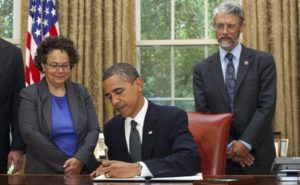 A plan to improve (?) management facets of the ocean and coasts of the northeastern U.S. states is headed for its final public hearings in Rhode Island and Maine. The second-to-last hearing about the Northeast Regional Ocean Plan is scheduled for Wednesday night at the Coastal Institute of the University of Rhode Island in Narragansett, Rhode Island. The last one is Thursday night at Glickman Library of the University of Southern Maine in Portland, Maine. The ocean plan is an outgrowth of the National Ocean Policy established by presidential executive order in 2010. It deals with many aspects of ocean planning, including marine life and habitat, commercial and recreational fishing and discusses national security. Website for the Northeast Regional Planning Body click here 13:11
A plan to improve (?) management facets of the ocean and coasts of the northeastern U.S. states is headed for its final public hearings in Rhode Island and Maine. The second-to-last hearing about the Northeast Regional Ocean Plan is scheduled for Wednesday night at the Coastal Institute of the University of Rhode Island in Narragansett, Rhode Island. The last one is Thursday night at Glickman Library of the University of Southern Maine in Portland, Maine. The ocean plan is an outgrowth of the National Ocean Policy established by presidential executive order in 2010. It deals with many aspects of ocean planning, including marine life and habitat, commercial and recreational fishing and discusses national security. Website for the Northeast Regional Planning Body click here 13:11
Athearn Marine Agency Boat of the Week: 36.3′ Wood Lobster,6 Cylinder John Deere 6076 Diesel
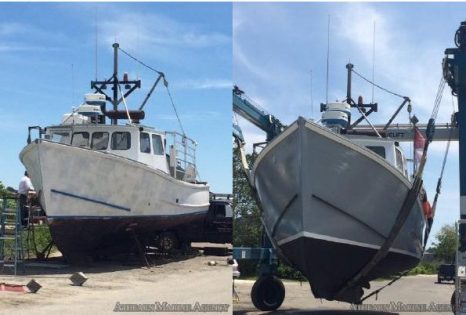 Specifications, information and 10 photos click here To see all the boats in this series, Click here 12:38
Specifications, information and 10 photos click here To see all the boats in this series, Click here 12:38
MSC puts P.E.I. Lobster fishery on notice, use less mackerel as bait, or risk eco-friendly stamp
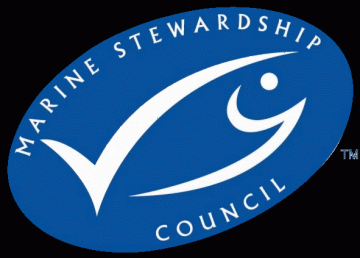 P.E.I. lobster fishermen will have to prove they’re using less mackerel for bait if they’re going to keep their eco-friendly certification. The Island lobster fishery achieved Marine Stewardship Council certification in November 2014. Yearly audits are done to make sure the fishery continues to be ecologically sustainable, while the council encourages consumers to purchase sustainably-caught fish with special branding — a little blue logo incorporating a check mark and a fish. To keep that certification, MSC auditors have asked the fishery to meet five conditions — two of which involve reducing the use of mackerel for bait. Read the rest here 12:06
P.E.I. lobster fishermen will have to prove they’re using less mackerel for bait if they’re going to keep their eco-friendly certification. The Island lobster fishery achieved Marine Stewardship Council certification in November 2014. Yearly audits are done to make sure the fishery continues to be ecologically sustainable, while the council encourages consumers to purchase sustainably-caught fish with special branding — a little blue logo incorporating a check mark and a fish. To keep that certification, MSC auditors have asked the fishery to meet five conditions — two of which involve reducing the use of mackerel for bait. Read the rest here 12:06
Opinion: A remedy for overregulation – Each government agency should answer to a board of directors
 If the 2016 presidential election has proved anything so far, it’s that millions of Americans know something is seriously wrong in Washington and they want it fixed. They’re right. The fact is that needless regulations, gross mismanagement and outright fraud have crippled our economy, stifled businesses and choked off job creation. The federal government collects $3.5 trillion in taxes and then forces us to pay another $2 trillion in regulation costs — and then another $1 trillion in waste and fraud. The gross domestic product has only averaged 1.7 percent annual growth over the last 15 years compared to 3.5 percent over the previous 50 years. That’s why the middle class has not had a raise in 15 years. Read the rest here 10:46
If the 2016 presidential election has proved anything so far, it’s that millions of Americans know something is seriously wrong in Washington and they want it fixed. They’re right. The fact is that needless regulations, gross mismanagement and outright fraud have crippled our economy, stifled businesses and choked off job creation. The federal government collects $3.5 trillion in taxes and then forces us to pay another $2 trillion in regulation costs — and then another $1 trillion in waste and fraud. The gross domestic product has only averaged 1.7 percent annual growth over the last 15 years compared to 3.5 percent over the previous 50 years. That’s why the middle class has not had a raise in 15 years. Read the rest here 10:46
Commercial fishermen hit back at machine gun claims of Labor candidate for Wide Bay Lucy Stanton
 Queensland Seafood Industry Association responds – It probably comes as no surprise to most that you (Lucy Stanton) are pinpointing your focus on net fishing operations in the federal electorate of Wide Bay that you are running for in Saturday’s election. It would seem that you are trying to appeal to voters on the back of the “net free zones” brought in by the Queensland State Labor Government last year. Like the State Labor policy, there is no scientific basis for any of your claims that ocean beach netters cause any harm to the environment. You may be interested in knowing that there are strict regulations set in place for ocean beach netters to legally and sustainably net fish on the North Shore beaches. Their main target over the winter months is mullet, which recreational fishers do not typically catch. It is a specifically targeted fish with limited bi-catch and proven to be sustainable. Your claims in the article are disappointing to say the least. It appears clear that you are trying to create hysteria in the hope of getting “airplay” for your own benefit in your election campaign. Read the response here 09:21
Queensland Seafood Industry Association responds – It probably comes as no surprise to most that you (Lucy Stanton) are pinpointing your focus on net fishing operations in the federal electorate of Wide Bay that you are running for in Saturday’s election. It would seem that you are trying to appeal to voters on the back of the “net free zones” brought in by the Queensland State Labor Government last year. Like the State Labor policy, there is no scientific basis for any of your claims that ocean beach netters cause any harm to the environment. You may be interested in knowing that there are strict regulations set in place for ocean beach netters to legally and sustainably net fish on the North Shore beaches. Their main target over the winter months is mullet, which recreational fishers do not typically catch. It is a specifically targeted fish with limited bi-catch and proven to be sustainable. Your claims in the article are disappointing to say the least. It appears clear that you are trying to create hysteria in the hope of getting “airplay” for your own benefit in your election campaign. Read the response here 09:21
A LIFO Win for the Inshore Fleet! Maybe. Who wins when they redistribute the quota is the next question.
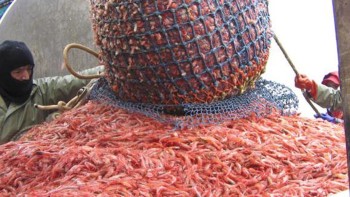 The Ministerial Advisory Panel conducting an external review of the Last-In, First-Out policy (LIFO) released its recommendations yesterday. The Panel recommended abolishing LIFO and implementing permanent proportional sharing.The recommendation went on to advise LIFO be replaced with a proportional sharing approach. There, each quota holder receives a fixed percentage of the resource. For that, the panel has also advised the area fished by the inshore fleet, Shrimp Fishing Area 6 (SFA 6), use 1997 to 2009 as a reference period in establishing the new percentages, given the changes to quota shares forced by LIFO then to now. Shares should be based on total accumulated allocations over that period, for those still around in 2009, the report states. This will reveal the real winners. Two articles, click here, and click here Read the Report of the Ministerial Advisory Panel click here 7.1 lists the “options” Read the Press Release from FFAW-Unifor click here 08:03
The Ministerial Advisory Panel conducting an external review of the Last-In, First-Out policy (LIFO) released its recommendations yesterday. The Panel recommended abolishing LIFO and implementing permanent proportional sharing.The recommendation went on to advise LIFO be replaced with a proportional sharing approach. There, each quota holder receives a fixed percentage of the resource. For that, the panel has also advised the area fished by the inshore fleet, Shrimp Fishing Area 6 (SFA 6), use 1997 to 2009 as a reference period in establishing the new percentages, given the changes to quota shares forced by LIFO then to now. Shares should be based on total accumulated allocations over that period, for those still around in 2009, the report states. This will reveal the real winners. Two articles, click here, and click here Read the Report of the Ministerial Advisory Panel click here 7.1 lists the “options” Read the Press Release from FFAW-Unifor click here 08:03



































